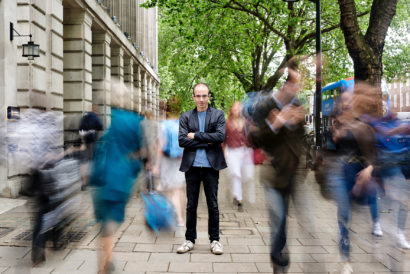 MLF Chapter & Verse
MLF Chapter & Verse
The Manchester Literature Festival Blog
Review: Yuval Noah Harari
Is human equality a notion that is approaching its sell-by date? MLF blogger Holly Aszkenasy reports back from our recent event with Sapiens and Homo Deus author Yuval Noah Harari.
In his best-selling Sapiens, historian Yuval Noah Harari took us on a grand tour of humankind, beginning with the violent overrun of planet Earth by our ancestors some 70,000 years ago, and ending with the declaration that we enter the 21st century veritable deities, on the cusp of breaking free of the bonds of our own biology. And ‘is there anything more dangerous,’ he asks, ‘than dissatisfied and irresponsible gods who don’t know what they want?’
The follow-up, Homo Deus: A Brief History of Tomorrow, is Harari’s answer to that question. His talk for the Manchester Literature Festival, titled ‘The New Inequality: The Future of Inequality in the 21st Century,’ provided a preview of some of the ideas explored in the book, released the same day. In a polished and engaging presentation, Harari outlined his theory of the ‘new’ inequality: that thanks to huge technological strides — and specifically, artificial intelligence — the coming decades will witness a dramatic reversal of the egalitarian gains of the 20th century. As AI begins to offer humans the unprecedented ability to ‘upgrade’ ourselves, the most important products of the next hundred years will be ‘bodies, brains and minds.’ This, Harari believes, will lead to the emergence of a biological elite: smarter, healthier, and possibly even immortal, while the rest of humanity will be consigned to languish in a reject bin of the ‘useless’ — an unfortunate class whose genetic makeup remains distressingly fallible, and whose livelihoods have all but vanished, snatched away by the robots who outsmart and outperform us at every turn. Economically marginalised and politically impotent, the fate of this vast underclass will depend almost entirely on the goodwill — or otherwise — of their biological superiors.
If all this sounds familiar, that’s because it is. Fear of technological innovation — that it will make us less than human, or at the very least, steal our jobs — is as old as Blake’s dark Satanic mills. And Harari’s likeable style and breezy delivery tied up his argument in rather too neat a bow. His claim that the rich would immediately and irreversibly monopolise a potential human upgrade toolkit is not borne out by current data. It does not automatically follow that access to new technology is tied to socio-economic privilege. Real wages the world over have been robust enough to match pace with innovation, allowing for sophisticated technologies to be broadly dispersed across the market. Almost everyone owns a smartphone: whether you are a migrant labourer from the slums of Sao Paulo or a Silicon Valley billionaire, that magical little computer you carry around in your pocket is identical. Although certainly, Harari makes the valid and disturbing point that the nature of the new technology on which his dystopian predictions are predicated means a gap between the haves and have-nots could well become impossibly difficult to bridge: that a biological elite would, for the first time in history, possess a very real physical and intellectual advantage over an underclass.
However all this unfolds, it is clear that the future will be determined politically, and not merely technologically; nor is any trajectory it takes either linear or inevitable. (Who, for example — even twenty years ago — could have foreseen the radical, untold consequences of the internet?) And if we are to shape the 21st century in such a way that we preserve and extend, rather than undermine, the egalitarian project of the 20th, then, as Harari argues, it is essential that governments start to act as political visionaries with a role to play in human destiny, rather than simply as petty managers of the day-to-day. Because, he warns, if we don’t like the new inequality that could well be staring us down, then we’ve still got time to do something about it.
—
Holly Aszkenasy was born in London and lives there now. Twitter @hollyaszkenasy
